The survey of registered voters in North Carolina was conducted Sept. 12-16, 2016.
FULL REPORT with METHODOLOGY & CROSS TABS
Nearly half of North Carolina voters likely to head to the polls this fall oppose HB2, the so-called “bathroom bill” that’s brought national attention to the state since its passage earlier this year. But despite distaste among many voters for the controversial legislation, one of its chief supporters has reason for some optimism in his re-election prospects, according to the latest Elon University Poll.
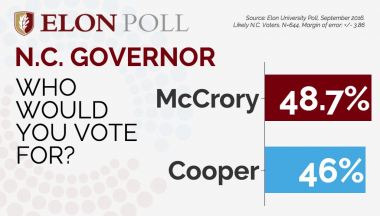 Republican Gov. Pat McCrory has built a narrow lead over his Democratic challenger, Attorney General Roy Cooper, in North Carolina’s 2016 gubernatorial election with a little less than two months to go until Election Day. McCrory is in front of Cooper 49-46 percent among likely voters, having moved ahead of his challenger since a spring Elon Poll that found Cooper with a 6-point lead over the incumbent governor, with his lead within the survey’s margin of error.
Republican Gov. Pat McCrory has built a narrow lead over his Democratic challenger, Attorney General Roy Cooper, in North Carolina’s 2016 gubernatorial election with a little less than two months to go until Election Day. McCrory is in front of Cooper 49-46 percent among likely voters, having moved ahead of his challenger since a spring Elon Poll that found Cooper with a 6-point lead over the incumbent governor, with his lead within the survey’s margin of error.
Both McCrory and Cooper have strong support with their party. 92 percent of Republicans are backing McCrory while 87 percent of Democrats favor Cooper. McCrory is winning 60 percent of the crucial independent vote within the sample.
“McCrory has seen a notable surge since the Elon Poll surveyed the race in the spring,” said Jason Husser, assistant professor of political science and the director of the Elon University Poll. “Both candidates are running competitive and expensive campaigns, so it’s likely that this race for governor will remain one of the closest in the country right up until voters head to the polls in November.”
The campaigns are also divided on race. Cooper is winning 93 percent of African-American likely voters. However, McCrory leads Cooper 63 percent to 37 percent among whites. A slight gender gap exists. McCrory is winning men by 10 points but losing women by 7 points.
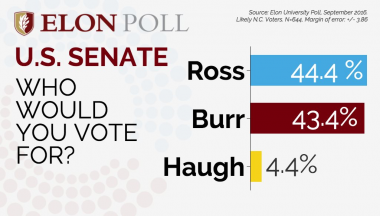 The U.S. Senate contest between incumbent Republican Richard Burr and his Democratic challenger, Deborah Ross, is a virtual dead heat, with 44.4 percent of likely voters expected to choose Ross, compared to 43.4 percent who are backing Burr, now seeking a third term in the U.S. Senate. Ross has gained ground since the April Elon University Poll, which found her trailing 37-33 percent among registered voters.
The U.S. Senate contest between incumbent Republican Richard Burr and his Democratic challenger, Deborah Ross, is a virtual dead heat, with 44.4 percent of likely voters expected to choose Ross, compared to 43.4 percent who are backing Burr, now seeking a third term in the U.S. Senate. Ross has gained ground since the April Elon University Poll, which found her trailing 37-33 percent among registered voters.
Husser said the reversal in the U.S. Senate race is surprising, particularly given that fellow Republican Pat McCrory has improved his standing. Future polling could help provide more insight, he said.
“We may have simply recorded a short-term blip, but we also might have found an emerging trend,” Husser said. “We suspect Burr’s numbers have potential to shift in coming weeks given a campaign cycle with huge advertising budgets.”
The live-caller, dual frame (landline and cell phone) survey of 799 registered voters was conducted from Sept. 12-16, 2016. Of those respondents, 644 said they are likely to vote in the November election. Survey results in this news release present responses from those self-identified registered voters who say they are likely to vote in the Nov. 8 election and has a margin of error of +/- 3.86 percentage points.
HB2 AND THE N.C. GOVERNOR’S RACE
Adopted in March, the HB2 law includes a primary provision that requires people to use the public bathroom in North Carolina that matches the gender on their birth certificate, and was passed in response to the city of Charlotte’s effort to allow transgender people to use the public restroom that aligns with their gender identity.
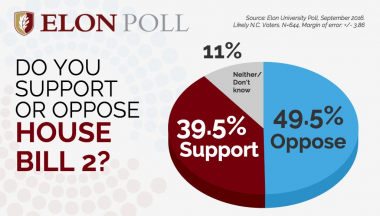 Nearly half — 49.5 percent — of likely voters in the state are opposed to House Bill 2, which was passed in March by the General Assembly and signed into law by Gov. McCrory. The law has recently generated another round of national attention with the announcements last week by the NCAA and the ACC that they would relocate championship contests scheduled to be held in North Carolina to locations outside the state due to HB2.
Nearly half — 49.5 percent — of likely voters in the state are opposed to House Bill 2, which was passed in March by the General Assembly and signed into law by Gov. McCrory. The law has recently generated another round of national attention with the announcements last week by the NCAA and the ACC that they would relocate championship contests scheduled to be held in North Carolina to locations outside the state due to HB2.
More than a third — 39.5 percent — of likely voters said they support HB2, while 11 percent said they neither oppose nor support it, or don’t know how they feel about the law.
Husser said that the HB2 issue has proven to be a difficult one for the McCrory coalition. “It is easy to imagine the governor enjoying a more comfortable margin if a more popular issue such as the $2 billion in funding for education, roads, parks and infrastructure projects approved this year was a more central campaign theme than a divisive issue like HB2,” Husser said.
Q: Do you support or oppose HB2?
- Support: 39.5 percent
- Oppose: 49.5 percent
- Neither/No opinion: 7.1 percent
- Don’t know: 3.5 percent
How has the passage of HB2 impacted the governor’s race, given that McCrory has been reiterated his support for the controversial law?
Among likely voters, 27 percent said they are more likely to vote for McCrory this fall because of the way he has handled the legislation, while 36 percent said they were less likely to re-elect the governor. A segment nearly as large — 35 percent — said McCrory’s handling of the law made no difference in their preference in governor’s race.
When considering a voter’s opinion of HB2 and choice for governor, it appears that McCrory is still able to attract voters who oppose the controversial law. Among those planning to vote for McCrory, 25 percent said they oppose HB2. On the flipside, 14 percent of those planning to vote for Cooper say they support HB2.
Q: Has Gov. Pat McCrory’s handling of HB2 made you more or less likely to vote to re-elect him as governor?
- More likely: 26.9 percent
- Less likely: 36.2 percent
- No difference: 34.6 percent
- Don’t know: 2.1 percent
Nearly 60 percent of likely voters believe that HB2 has damaged North Carolina’s reputation, compared to 11 percent who believe it has improved the state’s reputation. About a quarter of likely voters say the state’s reputation is about the same as it was before HB2 was passed.
Digging deeper, analysis shows a sizable group of voters who support HB2, but nonetheless believe North Carolina’s reputation has suffered since the law was adopted. Among those who support the law, more than a third – 36 percent – believe that the state’s national reputation has worsened since HB2, while about a quarter – 23 percent – of those HB2 supporters say it has improved. Supporters of the law were more likely to say the state’s reputation has remained about the same since the law was passed than those that oppose the law or don’t have an opinion about it.
Q: Regardless of what you think about HB2 itself, do you think the national reputation of North Carolina is better, worse, or about the same since HB2 passed?
- Better: 11.4 percent
- Worse: 59.9 percent
- About the same: 23.1 percent
- Don’t know: 5.1 percent
Breaking down voter opinions on HB2, which was passed by a Republican-controlled legislature and signed into law by a Republican governor, by party affiliation reflects an expected split along party lines, though Democrats appear to be more united in their opposition to the measure than Republicans are in their support of HB2.
Republicans support HB2 by nearly a two-to-one margin, with 58 percent saying they support HB2 and 31 percent saying they oppose it. Among Democrats, about two-thirds – 67 percent – oppose HB2 and 23 percent support the law. The split was relatively even among independents, with HB2 is opposed by 48 percent and 42 percent saying they support it.
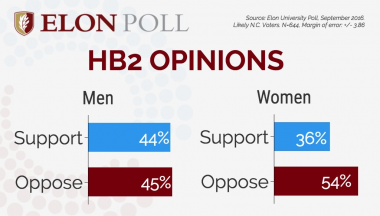 Turning to gender, women tend to oppose HB2 more often than support it while men are more evenly divided on the law. The survey found that 54 percent of women oppose the law while 36 percent support it. Among those men surveyed, 45 percent said they oppose HB2 while 44 percent support the law.
Turning to gender, women tend to oppose HB2 more often than support it while men are more evenly divided on the law. The survey found that 54 percent of women oppose the law while 36 percent support it. Among those men surveyed, 45 percent said they oppose HB2 while 44 percent support the law.
Race also appears to have an impact on how voters view the controversial law, with black voters more likely to oppose it, but also more likely to be undecided on the issue than white voters. White voters were close to being evenly split on the matter, with 48 percent opposing the law, 43 percent supporting it and 9 percent saying they didn’t know or neither supported or opposed HB2.
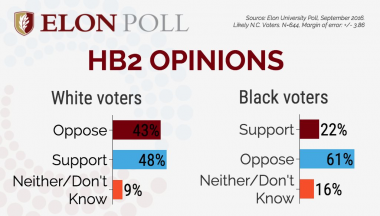 Black voters oppose the law 61 percent to 22 percent, with a larger segment not coming down on either side. Those that either didn’t know or neither supported or opposed HB2 accounted for 16 percent of black voters.
Black voters oppose the law 61 percent to 22 percent, with a larger segment not coming down on either side. Those that either didn’t know or neither supported or opposed HB2 accounted for 16 percent of black voters.
“It is difficult to make the case that HB2 has helped Republicans in North Carolina,” Husser said. “Opposition to the legislation is widespread, but support is concentrated to voters who would likely be Republican loyalists with or without HB2.”


